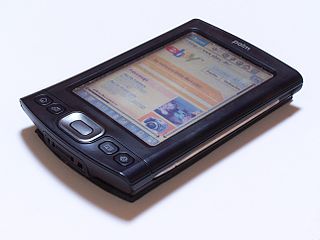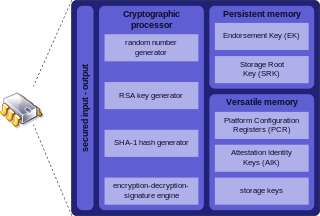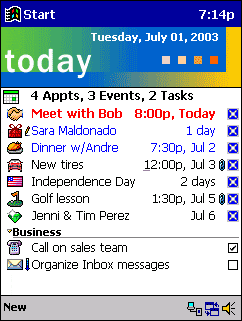Related Research Articles

A personal digital assistant (PDA) is a multi-purpose mobile device which functions as a personal information manager. Following a boom in the 1990's and 2000's, PDA's were mostly displaced by the widespread adoption of more highly capable smartphones, in particular those based on iOS and Android in the late 2000's, and thus saw a rapid decline.

A Pocket PC is a class of personal digital assistant (PDA) that runs the Windows Mobile or Windows Embedded Compact operating system that has some of the abilities of modern desktop PCs. The name was introduced by Microsoft in 2000 as a rebranding of the Palm-size PC category. Some of these devices also had integrated phone and data capabilities, which were called Pocket PC Phone Edition. Windows "Smartphone" is another Windows CE based platform for non-touch flip phones or dumber phones.
Windows Embedded Compact, formerly Windows Embedded CE, Windows Powered and Windows CE, was an operating system developed by Microsoft for mobile and embedded devices. It was part of the Windows Embedded family and served as the foundation of several classes of devices including the Handheld PC, Pocket PC, Auto PC, Windows Mobile, Windows Phone 7 and others.
The Encrypting File System (EFS) on Microsoft Windows is a feature introduced in version 3.0 of NTFS that provides filesystem-level encryption. The technology enables files to be transparently encrypted to protect confidential data from attackers with physical access to the computer.
End-to-end encryption (E2EE) is a private communication system in which only communicating users can participate. As such, no one else, including the communication system provider, telecom providers, Internet providers or malicious actors, can access the cryptographic keys needed to converse. End-to-end encryption is intended to prevent data being read or secretly modified, other than by the true sender and recipient(s). The messages are encrypted by the sender but the third party does not have a means to decrypt them, and stores them encrypted. The recipients retrieve the encrypted data and decrypt it themselves. Because no third parties can decipher the data being communicated or stored, for example, companies that provide end-to-end encryption are unable to hand over texts of their customers' messages to the authorities.

Norton Utilities is a utility software suite designed to help analyze, configure, optimize and maintain a computer. The latest version of the original series of Norton Utilities is Norton Utilities 16 for Windows XP/Vista/7/8 was released 26 October 2012.
Windows Mobile is a discontinued mobile operating system developed by Microsoft for smartphones and personal digital assistants.

PC Tools is a collection of software utilities for DOS developed by Central Point Software.

Trusted Platform Module (TPM) is an international standard for a secure cryptoprocessor, a dedicated microcontroller designed to secure hardware through integrated cryptographic keys. The term can also refer to a chip conforming to the standard ISO/IEC 11889. Common uses are to verify platform integrity, and to store disk encryption keys.

BitLocker is a full volume encryption feature included with Microsoft Windows versions starting with Windows Vista. It is designed to protect data by providing encryption for entire volumes. By default, it uses the Advanced Encryption Standard (AES) algorithm in cipher block chaining (CBC) or "xor–encrypt–xor (XEX)-based Tweaked codebook mode with ciphertext Stealing" (XTS) mode with a 128-bit or 256-bit key. CBC is not used over the whole disk; it is applied to each individual sector.

FreeOTFE is a discontinued open source computer program for on-the-fly disk encryption (OTFE). On Microsoft Windows, and Windows Mobile, it can create a virtual drive within a file or partition, to which anything written is automatically encrypted before being stored on a computer's hard or USB drive. It is similar in function to other disk encryption programs including TrueCrypt and Microsoft's BitLocker.
This is a technical feature comparison of different disk encryption software.

Jawbreaker is a port of SameGame for the Pocket PC bundled with the Microsoft Windows Mobile 2003 operating system for PDAs. The operating system, and thus the game, was officially released on April 7, 2003. The game itself was developed by American studio oopdreams software, Inc. Jawbreaker is officially listed as one of the "Core Applications" of the Windows Mobile software family, in a paper released by Microsoft. In Windows Mobile 5.0 and Windows Mobile 6.0 it is called Bubble Breaker. The original non-bundled version of the game is available from the developer itself as Bubblets.
ThinkVantage Technologies is a set of system support utilities to reduce total cost of ownership of Lenovo brand desktop and laptop computers.
This is a comparison of online backup services.
Secure USB flash drives protect the data stored on them from access by unauthorized users. USB flash drive products have been on the market since 2000, and their use is increasing exponentially. As businesses have increased demand for these drives, manufacturers are producing faster devices with greater data storage capacities.

ZENworks, a suite of software products developed and maintained by OpenText for computer systems management, aims to manage the entire life cycle of servers, of desktop PCs, of laptops, and of handheld devices such as Android and iOS mobile phones and tablets. As of 2011 Novell planned to include Full Disk Encryption (FDE) functionality within ZENworks. ZENworks supports multiple server platforms and multiple directory services.

VeraCrypt is a free and open-source utility for on-the-fly encryption (OTFE). The software can create a virtual encrypted disk that works just like a regular disk but within a file. It can also encrypt a partition or the entire storage device with pre-boot authentication.

Pocket PC 2000 was the first member of the Windows Mobile family of mobile operating systems that was released on April 19, 2000, and was based on Windows CE 3.0. It is the successor to the operating system aboard Palm-size PCs. Backwards compatibility was retained with such Palm-size PC applications.
References
- ↑ Glass, Brett (May 6, 2003). "Lock Down Your Computer". PC Magazine . Vol. 22, no. 8. Retrieved August 1, 2024.
- ↑ Brooks, Jason (July 29, 2002). "Security in Hand; PDA defense and PDA secure provide strong encryption and password protection for corporate handheld devices". eWeek. ProQuest 198537234 . Retrieved August 1, 2024– via ProQuest.
- ↑ Vines, Russell Dean (2002). Wireless Security Essentials: Defending Mobile Systems from Data Piracy. Wiley. p. 197. ISBN 9780471428114.